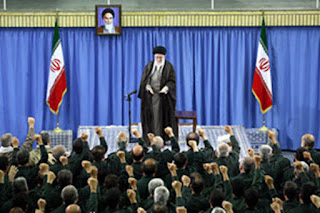Who makes a loss to the Revolutionary
Guards in the terrorist list?
Iran Focus
London, 27 Jun - When the Iranian Regime launched its failed missile attacks on ISIS militants in Deir ez-Zour, Syria, supposedly in retaliation for the recent terror attacks in Tehran, but failed to notify the US-backed troops who were fighting ISIS on the ground, it sent a message.
Iran doesn’t want to destroy terrorist organisations, indeed they back quite a few; they just want control of the Middle East.
Ramazan Sharif, a general in the Islamic Revolutionary Guards Corps (IRGC) confirmed as much when he spoke to the Regime-affiliated news media.
He said: “The Saudis and Americans are especially receivers of this message. Obviously and clearly, some reactionary countries of the region, especially Saudi Arabia, had announced that they are trying to bring insecurity into Iran.”
The Iranian Regime is the leading state sponsor of terrorism in the world and its military is ‘armed to the teeth’, but it may be Supreme Leader Ali Khamenei’s private army, the IRGC, that poses the greatest threat to the rest of the world.
The IRGC, who answer to no one but Khamenei, has been at the heart of the most destructive campaigns by the Iranian Regime.
Zachary Keck, the former managing editor of The National Interest, wrote a
piece on the Iranian Regime and its military arsenal in which he determined that the IRCG pose a credible threat to US security.
This is why the IRGC should be designated a
foreign terrorist organisation (FTO) by the US Government. If they choose to pursue putting the IRGC on the terror list, it would cut off a good deal of the IRGC’s funding and boost the Iranian Resistance’s ability to advocate for and achieve regime change.
If the US does not want to make regime change in Iran part of its public foreign policy, this would be a great compromise.
The Iranian Resistance, which includes groups like the National Council of Resistance of Iran (NCRI) and the MEK, and its elected leader Maryam Rajavi, currently serves as a government-in-exile. They have a ten-point plan to create an Iran for the 21st century including a non-nuclear Iran, without links to terrorism or terrorist groups.
On July 1, the Resistance is holding a Free Iran rally in Paris with over 100,000 dignitaries, politicians and activists in attendance. The Iranian people want change and the Resistance will provide that.




Comments
Post a Comment